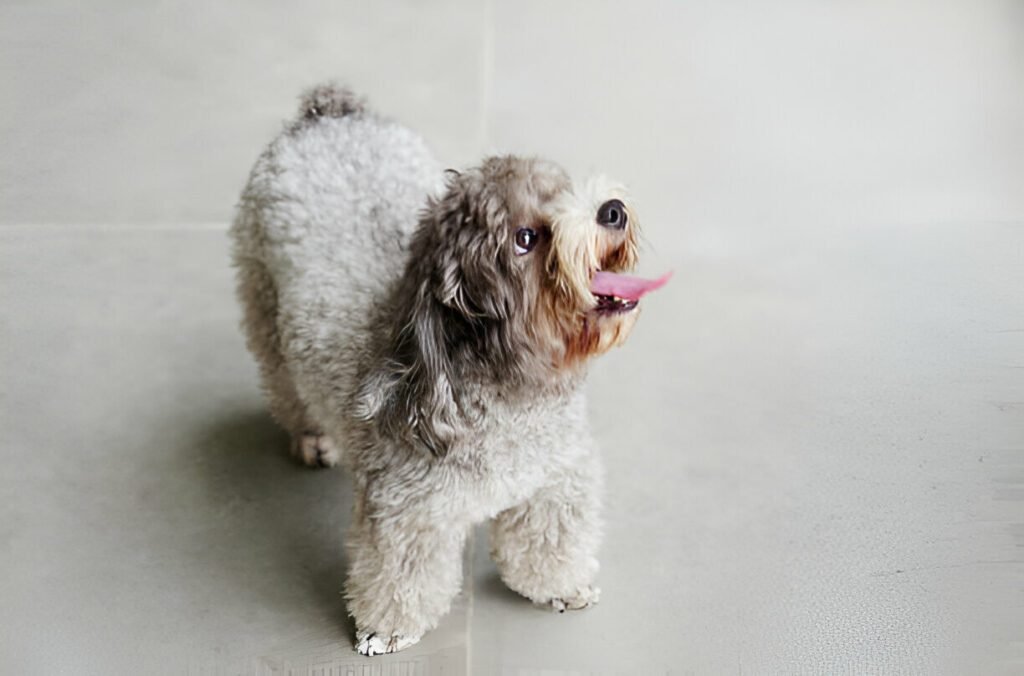It seems that tiny humans and pets always elicit the strongest response from us. There aren’t many smaller dog breeds than the Teacup Poodle, which is the tiniest of all Poodle varieties.
The designer/toy version of the common poodle that so many dog owners are familiar with and adore is the teacup poodle. Although its origins are unknown, the poodle has been recognized in Western Europe for over 400 years. Many people associate the poodle with France, but according to the AKC, the breed began as a kind of water retriever in Germany. Whatever its history, the breed is renowned for being incredibly trustworthy and trainable, and it has been employed in everything from true circus labor in France to retrieving.
Little and eventually toy poodles were created as the standard poodle’s popularity increased and there was a need for a smaller dog that could live in a smaller space for families. All that separates the teacup poodle from the toy poodle is size. American breeders just bred smaller versions; the AKC does not have a recognized standard. Other than size, the teacup poodle is just like the other poodle breeds in that it is brilliant, entertaining, and people-oriented.
Overview:
Height: Up to 9 inches
Weight: Up to 6 pounds
Lifespan:12–14 years
Colors: Black, silver, blue, red, brown, apricot, silver, cream, and white
Suitable for: People requiring a small space to live in, seniors, single people, families with older children, and a low-shedding, allergy-friendly breed low-shedding, allergy-friendly breed
Temperament: Smart, playful, loving, alert, social
Energy: 3/5
Trainability: 4/5
Health: 3 and a half out of 5
Lifespan: 3 and a half out of 5
Sociability: 4 and half of 5
Teacup Poodle Puppies
Since teacup poodles typically only produce one or two tiny litters of puppies at a time, there is typically a greater demand for the puppies than there are dogs available. Selecting a reputable breeder committed to producing the healthiest puppies is even more crucial because Teacup poodles are designed to be susceptible to numerous health problems (more on this later!).
If you would rather adopt a new pet than purchase one, inquire if any Teacup Poodles are available at your neighborhood shelter or through Poodle rescue organizations. Due to their minimal shedding, teacup poodles are an excellent choice for allergy sufferers. They get along well with seniors and kids as well.
Intelligence and Temperament

The temperaments of this poodles are typically described as lively, amiable, and quiet. These canines are gregarious and desire to be with their owners constantly. Teacup Poodles are intelligent dogs, but they may also be a little stubborn and have domineering personalities.
this dogs can take advantage of small dog owners’ occasional laxer training and socialization regimens than large dog owners, which frequently results in behavioral problems like aggressiveness.
Are These Dogs Suitable for Families?
This are small enough to live in almost any kind of housing arrangement, including apartments, houses with yards, and senior living centers. Nevertheless, families with little children shouldn’t consider them because of their modest size.
They are delicate and prone to injury, especially when they are young. Active young children may inadvertently harm these little dogs. Teacup Poodles are wonderful family pets if the family’s only children are older and more responsible for handling a small dog.
Due to their small stature and love of spending time with their owners, they are great companions on numerous family outings. The dog that receive a lot of socialization are more likely to mature into well-mannered adult canines and abstain from undesirable habits like excessive barking.
Can This Breed Coexist Peacefully With Other Pets?
this dogs typically get along well with other dogs after receiving the right socialization. Naturally, in almost every hostile confrontation with another dog, their size will work against them. Use caution when interacting with other dogs, even if they seem friendly, as even rough play can cause injuries to these small canines.
Teacup Poodles get along well with cats as well, if they are socialized and watched. Smaller in stature and with kind dispositions, they might be easier for cats to live with than larger dogs. Again, due to their diminutive stature compared to most cats, Teacup Poodles are susceptible to injury from unappreciative cats.
this dog may be excellent companions for little, unusual pets or birds because they are unlikely to be violent against them. Even little Teacup Poodles, meanwhile, could be perceived as predators by exotic pets, and their presence could cause anxiety.
Important Information for Teacup Poodle Owners

You must thoroughly examine the needs of every new pet you decide to bring home and learn as much as you can about their upkeep. What you need to know about becoming a Teacup Poodle owner is provided here!
Food and Nutrition Requirements
Teacup Poodles can thrive on any high-quality, nutritionally balanced dog food, whether it is dry or canned. The breed’s propensity for allergies, particularly food allergies, may influence the ideal diet for them. For this reason, some owners decide to make custom diets for their Teacup Poodles.
Diets created at home can be beneficial, but only after consulting a veterinarian to make sure the meal is nutrient-rich. Meal skipping is not advised for small breeds such as Teacup-Poodles, as they may struggle to maintain proper blood sugar levels, particularly in their puppy years. Additionally, teacup-poodles are susceptible to dental disease, which may need to be managed with particular diets.
Exercise
Although Teacup-Poodles are a fairly active breed, it is much easier to ensure that they receive the right amount of exercise due to their small stature compared to larger dogs. Teacup-Poodles don’t require a yard, which makes them an excellent option for elders or apartment life. Ideally, adult Teacup Poodles should exercise for an hour a day, divided into multiple 20- to 30-minute sessions.
For Teacup Poodles, walks and retrieve games are excellent forms of exercise. They might also take pleasure in practicing techniques and attending training sessions, which will give them both mental and physical activity.
Take care not to let your growing Teacup Poodles become overly active. Since their bones and joints are still growing, adolescents run the risk of hurting themselves when they play too rough.
Training
Poodles in general are regarded as the smartest dog breeds, and Teacup Poodles are no exception. When trained using positive, reward-based techniques, they are often intelligent and pick things up fast. Teacup Poodles, like many other little dogs, can occasionally be shockingly independent and even domineering.
Owners of teacup poodles who fail to socialize and teach their canines risk having a small pet that takes charge of the household. These Teacup-Poodles may occasionally even start to exhibit aggressive and biting behaviors.
Teacup Poodles, like all other canines, thrive when they are provided with boundaries and structure. Even though a snarling Teacup Poodle might not be taken as seriously as a snarling Rottweiler, it is still important to teach and socialize them for their own safety and mental health.
Grooming
this dog require a very rigorous grooming regimen, much like any other size Poodle. The good news is that brushing a Teacup Poodle doesn’t take much time because they are so tiny! Because they don’t shed a lot, Teacup Poodles are regarded as an allergy-friendly breed.
Nevertheless, the coat of these dog can easily get matted and tangled because the hair they lose gets stuck in it. At a minimum, they should be brushed four to five times per week. The coat of a Teacup Poodle likewise grows continuously, therefore regular haircuts are necessary to keep it in check.
Every six to eight weeks, or so, Teacup-Poodles should visit the groomer for a trim. To save money, some dog owners teach themselves how to clip their pets’ coats. In addition, frequent nail cutting, ear cleaning, and plucking are required for Teacup Poodles.
As previously noted, dental disease is a common problem for This dogs. Keeping your dog’s teeth as healthy as possible can be achieved by starting a dental care regimen early in life.
Health & Conditions
Sadly, breeding too little Teacup-Poodles frequently produces dogs that are more susceptible to a variety of health issues. The runts of the litter, many of whom are small because of inherited medical conditions, are frequently used to breed teacup dogs.
In an ideal world, dog breeders would select the healthiest examples to propagate, but when it comes to Teacup-Poodles, size selection frequently trumps temperament and health.
Make sure you are knowledgeable about potential health problems for your Teacup-Poodle and ready to handle them before deciding to purchase one.
Minor Conditions:
>Dental disease
>Allergies
>Progressive retinal atrophy
Serious Conditions:
>Luxating patellas
>Hypoglycemic
>Portosystemic shunt
>Hydrocephalus
>Heart defects
>Collapsing trachea
Minor Conditions:
They are prone to tooth disease.
Another issue with This dogs is allergies, both environmental and dietary.
Cup of tea Additionally, Poodles are susceptible to eye disorders including Progressive Retinal Atrophy.
Serious Conditions:
Loose kneecaps or luxating patellas are two common problems in these dogs.
They are susceptible to hypoglycemia, or low blood sugar, particularly as puppies.
A liver disease known as a portosystemic shunt is a genetic predisposition for these dogs
They also have a higher risk of developing hydrocephalus, a brain disorder.
Another issue with these dogs is heart abnormalities.
They might also experience respiratory disorders linked to a collapsing trachea.
Male vs female
Generally speaking, male Teacup Poodles weigh a little bit more than females. It’s common knowledge that male dogs are easier to teach and more lively than female dogs. Teacup Poodle females are typically more independent and obstinate.
Naturally, unless they are spayed, female Teacup Poodles will go into heat roughly twice a year. The healthiest options for any dog that isn’t going to be bred are usually spaying and neutering.
Three Unknown Facts Regarding Teacup Poodles:
They are not a distinct breed recognized by the AKC.
The Standard, Miniature, and Toy sizes of Poodles are the three official sizes recognized by the AKC. Since the AKC classifies any Poodle shorter than 10 inches as a Toy Poodle, Teacup Poodles are Toy Poodles. The phrase “Teacup Poodle” is mostly used by breeders to refer to their extremely small puppies and, frequently, to charge extra for them!
They don’t always behave like little canines.
Despite their small size, Teacup Poodles are willing to use all of their little muscles. When given the opportunity, they will seize control of the house and dominate all other animals and humans.
They go by a lot of other, prettier names.
There are other names for Teacup Poodles as well. They may go by the names Pudle, Caniche, Barbone, Chien Canne, or French Poodle.
Conclusion
it’s often said that size doesn’t always translate into superiority, and the Teacup Poodle is no exception. Make sure you are informed of any potential issues you may be facing if you have your heart set on one of these small puppies. All dogs should have loving homes, but they should also have owners who have done their homework and are aware of what they’re getting into before making a purchase. Make sure you’re ready to provide a secure home for your Teacup Poodle under any circumstances.
